Since June, 2010, I have been either living in Turkey or paying short visits to the U.S. Last week I broke my two-country streak by visiting a third country: France.
 <
You don’t visit a new place as a blank slate. You bring your life experiences along, the latest ones most of all. Living here in Turkey affected my approach to France and how I experienced that country.
Preconceptions and results: When my brain thinks “foreign language” these days, its gears start moving, and it prepares to turn sentences upside down. The subject goes to the fore. Then comes the object and the explanation words—the whens and wheres and whys—and finally, at the very end, the verb. Retooling my brain this way took awhile; I didn’t think I would ever be able to order my words into Turkish-style sentences. But after awhile, I discovered I could.
<
You don’t visit a new place as a blank slate. You bring your life experiences along, the latest ones most of all. Living here in Turkey affected my approach to France and how I experienced that country.
Preconceptions and results: When my brain thinks “foreign language” these days, its gears start moving, and it prepares to turn sentences upside down. The subject goes to the fore. Then comes the object and the explanation words—the whens and wheres and whys—and finally, at the very end, the verb. Retooling my brain this way took awhile; I didn’t think I would ever be able to order my words into Turkish-style sentences. But after awhile, I discovered I could.
The problem is, if I’m in a situation involving another–a third–foreign language, my brain has to re-tune, which takes longer than a week.
Similarly, I have also learned that when my brain thinks “foreign country” it now expects the customs and culture, the sights and scents and tastes and sounds of Turkey. This includes the nurturing kindness that makes Turks drive a half-hour out of their way to get us to the right road; run after us because we’ve left a notebook behind in a restaurant; and insist on treating us to tea because they’ve had the honor of helping us park in a tight spot outside their cafe. As I tell our houseguests, whose opinions of Turkey rise the longer they are here, “The Turks always come through.”
Realizing all that I have grown accustomed to, before I left for France, I tried to adjust my expectations. I told myself that some adjectives I’ve heard over the years about French people might actually be true: indifferent, unfriendly, shallow, even rude. I talked to expatriate friends who had visited or lived in France. “Be very polite,” several advised. “Say bonjourto shop clerks when you walk into a store. They’ll be more helpful.”
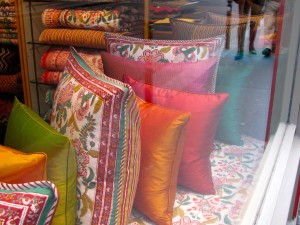 |
| “Bonjour. What nice pillows you have! I’m very sorry to disturb you, but could you please tell me how much that one costs?” |
A friend from home wrote to say she hadn’t encountered any rudeness at all in Paris; instead a woman had patted her shoulder one day on the train when she was visibly upset. Still, I braced myself for less-than-pleasant, or at least less-than-Turkish behavior.
Once in Paris, I found myself hanging back even when I encountered friendliness. I hated myself for being mistrustful, but my stereotypes ran deep and I couldn’t seem to shake them.
One day the public museums we hope to visit were on strike, and back at the hotel, I had some questions for the hotel manager. Do two museums on strike mean that all museums—or all government museums—are closed? Should we try to find a private museum? And how might we best verify what is open tomorrow, aside from trudging to each museum to check? Alas, the guy was not very helpful. Instead of trying to answer our questions, he launched into a personal story, telling us that he doesn’t know from day to day whether the metro or buses will be operating to get him to his job. “That’s Paris,” he finished bitterly.
 |
| Striking museum workers |
Overall, we found some French people aloof and others more outgoing and helpful, but all were polite. Not bad, not bad at all. We did wonder whether people would come to our assistance if we needed help. But I reminded myself that visitors to America probably ask themselves the same question.
The foreign tongue: Discomfort or anxiety about language can be an unrecognized source of stress. One of the reasons I haven’t been to neighboring Greece over these past few years is my unwillingness to deal with a different alphabet. I know, many Greeks speak English, but I dislike insisting people communicate in my language.
Fortunately, language was not overly problematic in France. For an English speaker who also speaks Spanish, French menus can be read and French signs mostly comprehended. I could not easily produce French words, and I struggled over our entire seven day trip to suppress my use of Turkish “var mi’s” and “simdi’s.” But I did come out with a French sentence one afternoon. Here it is, in all of its splendor: “Nous avons un nuit.” (I was presenting our reservation voucher to the hotel clerk).
Turkish is simply a whole lot harder because there are very few English cognates, and because of the aforementioned sentence structure.
I had a wistful “what if” feeling in France: if we had moved there in 2010 instead of Turkey, I think I could have been reading, writing and speaking fairly proficiently. That said, my miserable Turkish is appreciated by the folks of Asia Minor, who do realize their language is difficult. The French are less generous in awarding points for effort.
Food: I don’t suppose many Americans come to Paris longing for a ham sandwich, but I did. I love crusty, chewy bread, somewhat rare in Turkey, and I love butter, which is almost never served with bread here. The university where I worked for a year provided free lunch each day, and I did come to love the silky Turkish stews, salads made piquant with fresh oils, vinegars and juices, and soothing comfort puddings. But for the longest time I craved a bread-based, hand-held lunch.
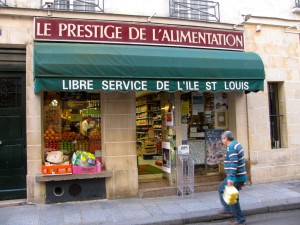 |
| Yes, I agree: eating is prestigious. |
I probably don’t have to tell you that in Turkey I miss easy access to pork. Thus, the typical French midday repast of a ham sandwich, served on baguette bread slathered with butter or a mixture of mayo and mustard, was a much-anticipated, mouth-watering treat.
Traffic: I have become a traffic-noticer. Istanbul is exceedingly hilly, with numerous bodies of salt water to navigate around. Its population is around fifteen million, its ancient roads are narrow, and despite high-priced petrol, private cars are ubiquitous. Yellow taxis roam the city, and while providing a convenience, they break traffic rules right and left. It is no surprise that Istanbul was recently designated the most congested city in Europe.
In Paris, to my surprise, the streets were calm. The city is flat and, aside from the Seine, it does not have water to circumvent. Vehicles are small; one sees cute Le Cars and tiny Fiat 500’s every day. The Paris metro system is much more extensive than Istanbul’s, and taxis are rare and expensive. I could actually walk down French sidewalks and across streets with only the rustle of trees as background noise. This helped make our trip serene even when we mostly didn’t know where we were going!
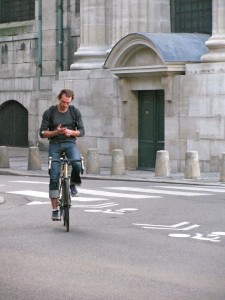 |
| This St. Sulpice street was so quiet that a biker decided to multitask. |
Clothing: I often admire what Turkish women are wearing. Just like French women, they dress beautifully, with color-coordinated scarves, slim boots, and just the right jackets. But Turkey also has headscarf women, who care more about modesty than stylishness. That actually provides me some cover. In Paris I felt intimidated; in Turkey I inhabit the happy middle, style-wise.
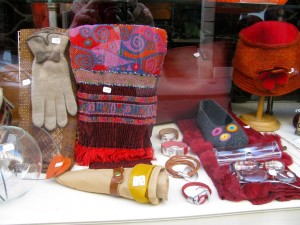 |
| Paris shop windows are marvelous. |
Two great countries. Turkey is definitely more personal, but both countries have highly distinctive cultures that can provide a wonderful immersion for visitors.

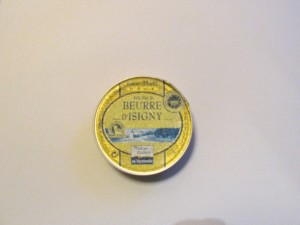

Lovely, beautifully structured and insightful post, Sue. But is Istanbul really up to the 20 million mark??
Have you ever considered about including a little bit more than just your articles? I mean, what you say is fundamental and all. But imagine if you added some great graphics or videos to give your posts more, “pop”! Your content is excellent but with pics and videos, this site could definitely be one of the greatest in its field. Good blog!
I want to express appreciation to the writer just for rescuing me from such a crisis. Because of browsing through the online world and seeing strategies which were not productive, I thought my entire life was gone. Being alive without the answers to the issues you have solved by way of your good blog post is a critical case, as well as the ones that might have in a wrong way damaged my career if I had not noticed your web site. Your primary talents and kindness in taking care of every item was vital. I’m not sure what I would have done if I hadn’t discovered such a point like this. I can also at this moment look ahead to my future. Thanks a lot so much for this high quality and effective help. I will not hesitate to recommend your blog post to any person who needs to have tips about this topic.
I just want to tell you that I’m newbie to weblog and truly liked you’re blog site. Very likely I’m want to bookmark your blog . You really come with very good article content. Kudos for sharing with us your web site.
Hello there, just became alert to your blog through Google, and found that it is really informative. I’m gonna watch out for brussels. I’ll be grateful if you continue this in future. Lots of people will be benefited from your writing. Cheers!
Cardoza@gmail.com
I value the article.Thanks Again. Much obliged.
Soderberg@gmail.com
Ham Sandwich Excitement: France from a Turkish Viewpoint | Sue’s Turkish Adventures
Zic@gmail.com
Huntoon@gmail.com